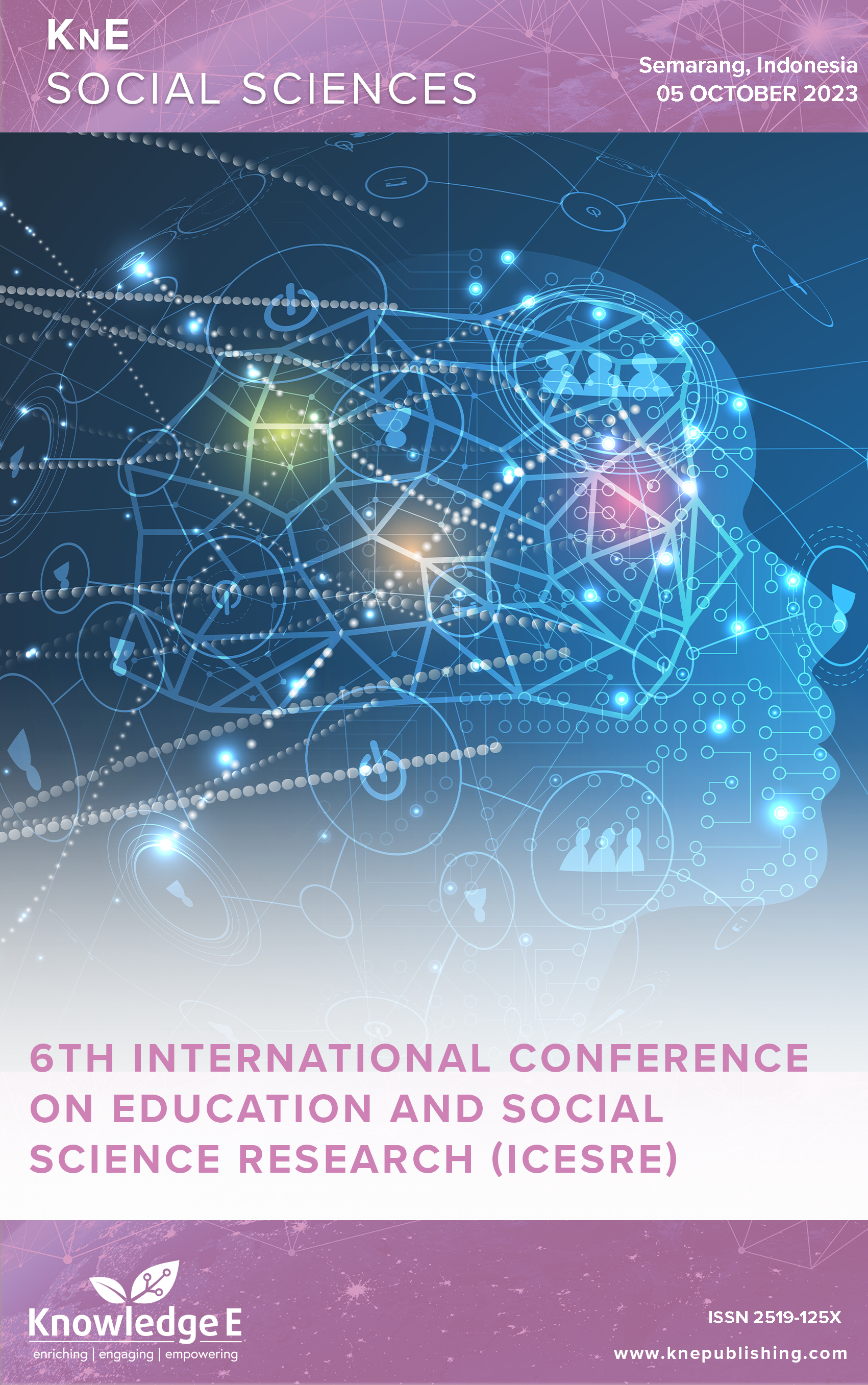Teacher Perceptions in Implementing Religious Character Education in Elementary Schools
DOI:
https://doi.org/10.18502/kss.v9i6.15261Abstract
Religiosity is the attitude and behavior of a person who is obedient in carrying out the teachings of the religion they adhere to. It is inherent in the person, fostering tolerance and harmony with followers of other religions. It serves as a reflection of their obedience to the teachings of the religion they follow. This research aims to determine how teachers perceive implementing religious character education in elementary schools. This type of research employs a descriptive qualitative method. The results of this research indicate the implementation of religious character education in elementary schools, achieved by integrating religious values into the school curriculum. In addition, schools conduct spiritual activities, and teachers serve as role models by exemplifying positive behaviors such as doing good deeds, helping others, maintaining discipline, and engaging in religious activities.
Keywords: character education, religious, elementary school
References
Savitri DI, Degeng INS, Akbar S. Peran Keluarga dan Guru dalam Membangun Karakter dan Konsep Diri Siswa Broken Home di Usia Sekolah Dasar
[the role of families and teachers in building the character and self-concept of broken home students in primary school age]. Jurnal Pendidikan: Teori, Penelitian, dan Pengembanga. 2016;1(5):861–4.
Sugiono S, Mahendra Y, Benyamin PI, Pantan F, Cahyono H. Internalization of Christian religious values in facing disruption of student character. In 2022. https://doi.org/10.2991/assehr.k.220702.011. DOI: https://doi.org/10.2991/assehr.k.220702.011
Salviana EA, Sudana IM, Cahyati WH. The analysis of religious observances and peer influences towards premarital sex occurrence in Sarolangun Municipality. In 2022. https://doi.org/10.2991/assehr.k.211125.015. DOI: https://doi.org/10.2991/assehr.k.211125.015
Washington BT. Character Building. Routledge; 2017.
Hoon CY. Putting religion into multiculturalism: conceptualising religious multiculturalism in Indonesia [Internet]. Asian Stud Rev. 2017 Jul;41(3):476–93. Available from: https://www.tandfonline.com/doi/full/10.1080/10357823.2017.1334761 DOI: https://doi.org/10.1080/10357823.2017.1334761
Cook CL, Cottrell CA, Webster GD. No good without God: Antiatheist prejudice as a function of threats to morals and values.Psycholog Relig Spiritual [Internet]. 2015;7(3):217–26. Available from: http://doi.apa.org/getdoi.cfm?doi=10.1037/rel0000013 DOI: https://doi.org/10.1037/rel0000013
Yufiarti, Nuraini S, Solihin M, Rachmadtullah R. Moral disengagement in middle school students: Survey in religious education. International Journal of Engineering and Technology(UAE). 2018;7(3.30 Special Issue 30).
Yufiarti NS. Solihin M, Rachmadtullah R. Moral disengagement in middle school students : Survey in religious education. International Journal of Engineering and Technology(UAE). 2018;7(3.30):80–1. DOI: https://doi.org/10.14419/ijet.v7i3.30.18160
Aswidar R, Saragih SZ. Karakter Religius,Toleransi, dan Disiplin pada Siswa Sekolah Menengah Pertama. Jurnal Imiah Pendidikan dan Pembelajaran. 2022 Mar 20;6(1):134. DOI: https://doi.org/10.23887/jipp.v6i1.43373
Camden C, Pratte G, Fallon F, Couture M, Berbari J, Tousignant M. Diversity of practices in telerehabilitation for children with disabilities and effective intervention characteristics: results from a systematic review [Internet]. Disabil Rehabil. 2020 Dec;42(24):3424–36. Available from: https://www.tandfonline.com/doi/full/10.1080/09638288.2019.1595750 DOI: https://doi.org/10.1080/09638288.2019.1595750
Asrial A, Syahrial S, Kurniawan DA, Alirmansyah A, Sholeh M, Zulkhi MD. The influence of application of local-wisdom-based modules toward peace-loving characters of elementary school students [IJOLAE]. Indonesian Journal on Learning and Advanced Education. 2022 May;4(2):157–70. DOI: https://doi.org/10.23917/ijolae.v4i2.17068
Hadisi L. Implementation of religious character education in coping with student bullying behavior (Implementasi Pendidikan Karakter Religius dalam Menanggulangi Perilaku Bullying Siswa). Shautut Tarbiyah. 2022 Nov;28(2):244. DOI: https://doi.org/10.31332/str.v28i2.4569
Pridayani M, Rivauzi A. Faktor Pendukung dan Penghambat Pelaksanaan Program Penguatan Pendidikan Karakter Religius Terhadap Siswa. An-Nuha. 2022 May;2(2):329–41. DOI: https://doi.org/10.24036/annuha.v2i2.188
Al Kafy A, Saha M, Faisal AA, Rahaman ZA, Rahman MT, Liu D, et al. Predicting the impacts of land use/land cover changes on seasonal urban thermal characteristics using machine learning algorithms. Build Environ. 2022 Jun;217:109066. DOI: https://doi.org/10.1016/j.buildenv.2022.109066
Aslamiyah YN. Markhamah. Character Education Values in Kahlil Gibran’s Broken Wings. In 2023. p. 2467–77. DOI: https://doi.org/10.2991/978-2-38476-086-2_195
Creswell JW. Educational Research: Planning, Conducting, and Evaluating Quantitative and Qualitative Reseach. New Jersey: Pearson; 2008.
Creswell JW. A concise introduction to mixed methods research. Sage Publications; 2014.
Sokip S, Akhyak A, Soim S, Tanzeh A, Kojin K. Character Building in Islamic Society: A Case Study of Muslim Families in Tulungagung, East Java, Indonesia. Journal of Social Studies Education Research. 2019;10:224–42.
Komariah N, Nihayah I. Improving the personality character of students through learning Islamic Religious Education. At-tadzkir: islamic. Educ J. 2023 Mar;2(1):65– 77. DOI: https://doi.org/10.59373/attadzkir.v2i1.15
Lottman TJ, Zawaly S, Niemiec R. Well-Being and well-doing: Bringing mindfulness and character strengths to the early childhood classroom and home. Positive Psychology Interventions in Practice [Internet]Cham: Springer International Publishing; 2017. pp. 83–105., Available from http://link.springer.com/10.1007/978-3-319-51787- 2_6 DOI: https://doi.org/10.1007/978-3-319-51787-2_6
Lestari WD, Sulistyono Y, Nasucha Y, Sabardila A. Language politeness and character educational values on the literacy module text for elementary school students as a part of AKSI Application Issued by the Ministry of Education and Culture. In 2023. p. 2428–50. https://doi.org/10.2991/978-2-38476-086-2_193. DOI: https://doi.org/10.2991/978-2-38476-086-2_193
Sulistyaningsih D, Purnomo P, Aziz A. Development of learning design for mathematics manipulatives learning based on E-learning and character building. International Electronic Journal of Mathematics Education [Internet]. 2018 Dec 23;14(1). Available from: http://www.iejme.com/article/development-of-learningdesign- for-mathematics-manipulatives-learning-based-on-e-learning-and-3996 DOI: https://doi.org/10.29333/iejme/3996
Anggito A, Sartono EK. The development of multicultural education comics to embed tolerance character for 4th grade of elementary school. Jurnal Prima Edukasia [Internet]. 2022 Jan 6;10(1):66–81. Available from: https://journal.uny.ac.id/index.php/jpe/article/view/40504 DOI: https://doi.org/10.21831/jpe.v10i1.40504

